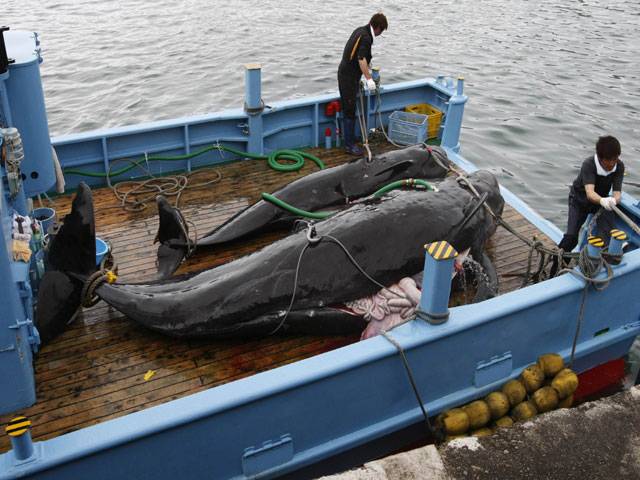AFP
THE HAGUE -The United Nations’ top court on Monday ordered Japan to end its annual Antarctic whale hunt, saying in a landmark ruling that the programme was a commercial activity disguised as science. “Japan shall revoke any existent authorisation, permit or licence granted in relation to JARPA II (research programme) and refrain from granting any further permits,” said the International Court of Justice’s Judge Peter Tomka.
Agreeing with Australia, which in 2010 hauled Japan before the Hague-based ICJ in a bid to end whale hunting in the Southern Ocean, Tomka said that “special permissions granted by Japan are not for purposes of scientific research.”
“The evidence does not establish that the programme’s design and implementation are reasonable in relation to its stated (scientific) objectives,” Tomka said.
While Norway and Iceland have commercial whaling programmes in spite of a 1986 International Whaling Commission (IWC) moratorium, Japan insisted its programme was scientific, while admitting that the resulting meat ended up on plates back home.
Tokyo was accused of exploiting a legal loophole in the 1986 ban on commercial whaling that allowed the practice to collect scientific data.
Conservation groups hailed the ruling, which Japan said it would respect despite “deep disappointment”. “As a state that respects the rule of law... and as a responsible member of the global community, Japan will abide by the decision of the court,” chief negotiator Koji Tsuruoka told reporters outside the ICJ. Geert Vons, director of the Sea Shepherd conservation group in The Netherlands, told AFP that while the ruling applied to Japan’s JARPA II programme, a scientific programme with a more solid base could see a return to whaling in the Antarctic. “If Japan or another country comes up with another programme for scientific research that is built a lot better, whaling could resume,” Vons said.
Japanese government spokesman Noriyuki Shikata did not exclude seeking a resumption of Antarctic whaling. “In terms of a future course of action, we have to carefully examine the content of the judgement,” Shikata told AFP. Australia said that since 1988 Japan has slaughtered more than 10,000 whales under the programme, putting the Asian nation in breach of international conventions and its obligation to preserve marine mammals and their environment.
“This decision sends a clear message to governments around the world that the exploitation of animals will no longer be tolerated and animals must be protected at the highest level,” said Claire Bass, head of wildlife campaigns at the World Society for the Protection of Animals. “All eyes are now on Japan to respect this decision,” she said.
The court ruled overwhelmingly in favour of Australia in the case, which the country launched in 2010. Clare Perry of the Environmental Investigation Agency said the ruling “lays to rest, once and for all, the grim travesty of Japan’s so-called ‘scientific’ whaling.”
“Next, the world needs to focus its attention on Japan’s whaling in the North Pacific, where it continues to issue permits to kill up to 500 whales annually in hunts using the same ‘scientific’ clause that has now been condemned beyond dispute by the international court.”
While Japan said its research programme was aimed at studying the viability of whale hunting, the ICJ found that it had failed to examine ways of doing such research without killing whales, or at least while killing fewer whales.
Japan has consistently defended the practice of eating whale meat as a culinary tradition and vowed it would “never stop whaling”.
In April last year Tokyo announced its whaling haul from the Southern Ocean was at a record low because of “unforgivable sabotage” by Sea Shepherd activists.
Sea Shepherd had called the ICJ case make-or-break for whales in the Southern Ocean. Established in 1945 to rule in disputes between countries, the ICJ is the United Nations’ highest judicial body and the only one of five principal UN bodies not located in New York.
Saturday, April 20, 2024
Top UN court orders Japan to end Antarctic whale hunt

Caption: Top UN court orders Japan to end Antarctic whale hunt
Pak economy improving, funds will be provided on request: IMF
9:57 PM | April 19, 2024
Minister advocates for IT growth with public-private collaboration
9:57 PM | April 19, 2024
Judges' letter: IHC seeks suggestions from all judges
9:55 PM | April 19, 2024
Formula 1 returns to China for Round 5
9:05 PM | April 19, 2024
Germany head coach Julian Nagelsmann extends contract till 2026 World Cup
9:00 PM | April 19, 2024
A Tense Neighbourhood
April 19, 2024
Dubai Underwater
April 19, 2024
X Debate Continues
April 19, 2024
Hepatitis Challenge
April 18, 2024
IMF Predictions
April 18, 2024
Kite tragedy
April 19, 2024
Discipline dilemma
April 19, 2024
Urgent plea
April 19, 2024
Justice denied
April 18, 2024
AI dilemmas unveiled
April 18, 2024
ePaper - Nawaiwaqt
Advertisement
Nawaiwaqt Group | Copyright © 2024





